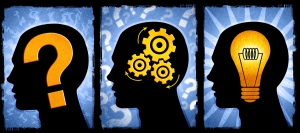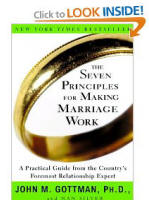Creating and Maintaining Healthy Relationships
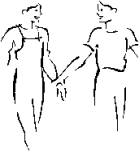
Insights about creating healthy and abundant relationships.
During my learning new lifestyle skills, to heal my compulsive overeating, and open my life up to new social connections, I learned that life is about interconnected relationships—with ourselves and other people.
I needed to learn how to establish good relationships with people, not just FOOD! I had to find out how to be honest with others and myself, both at home and at work. I started by setting right my family relationships with my father, mother, grandparents, and the God of my understanding. I did this by using the tools of a support group.
I really wanted to learn how to deal honestly and openly with all relationships. I found if there were problems to work through, even if they were difficult to face, I should face them.
This area was one of the most challenging for me. I needed to find a counselor who could help me through all this learning. (The Essential Skills section has suggestions on getting therapeutic help for your journey.) It is in the family system that we learn about how to explore our world, what our identity is and how to develop skills for being competent in the world.
We also experience—at a deep core level—our unconditional value as human beings and learn how to establish healthy patterns of intimacy and concern for others. We also learn about how to resolve problems and to set limits for ourselves. The family is an ongoing laboratory where we gain knowledge of all of these things.
At each stage of our life, we learn a predictable series of skills. If development is impeded at a particular point, an important skill may not be learned affecting the next stage. The first four to six years of life are when we are most dependent, receptive, and malleable—and they have a profound effect on the rest of our lives. For me, being wounded at many of the stages affected all of my relationships—with myself and other people.
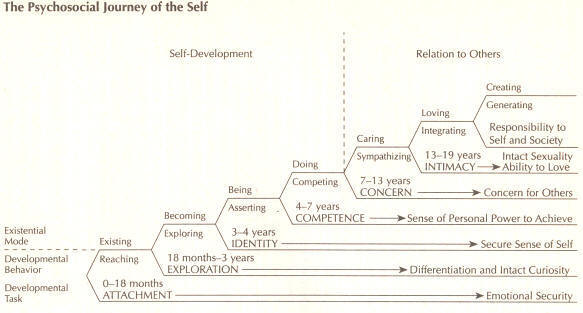
From Harville Hendrix, Keeping The Love You Find, 1992
I learned about these concepts in Keeping The Love You Find, by Harville Hendrix, (1992, Pocket Books). Check out: Imago Theory The book explains with amazing clarity how our initial relationships form an imago, a buried potential image, and consequently create an unconscious attraction to fall in love with someone who has the positive and negative traits of our imperfect parents. This is someone who we feel will meet our emotional needs—except that they can’t. My parents’ positive traits were: they liked the earth, nature, and flowers. They had an intense spiritual side, were sensitive and sincere, intelligent and honest. Their negative traits were: many times they didn’t take care of themselves, abused alcohol, food and drugs. They didn’t communicate well about feelings or work through problems in healthy ways, and they finally abandoned me—if not physically, at least emotionally. I do know tha that my parents DID love me a lot and were doing the best that they could with their level of understanding and with the challenges that they were facing.
I was baffled by relationships. Were there really any healthy ones on earth? I hadn’t seen them. How did people create one? I sure hadn’t learned about how to have one. I am so grateful that I could learn—through books, classes, and individual counseling about nurturing relationships.
These were my initial experiences:
1. My parents’ failed relationship and their individual, multiple, unhealthy, unsuccessful marriages to other people.
2. My first relationship at age 21 to a person with many fine qualities as well as many addictive habits and harmful patterns: alcohol, drugs, and non-monogamous sex. I ended this relationship after 16 years.
3. Few of my friends and other family members had loving, long-term relationships.
4. I noticed that the same patterns just kept repeating for people—again and again—but I didn’t know how to stop and change the process. I became aware of the fact that if people didn’t LOOK at the root patterns, which resided under the surface, they created the same problems, just with a different person.
5. I thought that if heterosexual people had so many problems with relationships, that as a gay man, I was sure that I’d have to move to Mars to find someone.
To transform the patterns in my life, I chose to explore the root causes and try out new skills and choices. This took extensive soul-searching and working through the kinds of exercises included in Harvelle's book. I kept notes in my journals as I dated (about 100 people!) Through this process, I went through the normal socialization process, but at 40 years old, that I hadn’t gone through in my teens. I noted all my feelings, compulsive eating binges, successes, failures—all my ups and downs—as I noticed that “those people whom I wanted to fall in lust with me, didn’t and those people whom I did not want to fall in lust with me did!”
My counselor shared resources with me on healthy dating and self-love and helped me put together a list of the qualities that for me were essential in a heart-centered, loving, and conscious relationship—both with myself and for another person.
My counselor encouraged me to think about giving to myself all of the love and nurturing that I’d like to receive from someone else and really be willing to give it to myself. To ask myself, what I would like? Am I willing to give it to myself? What would my vision for the relationship be?
She told me that I needed to complete the inner work before the outer need would be met. That I would get the person I needed as I healed and that my deepest inner needs would be met when I was ready. She said that “I’m the cake and the relationship is the icing on it.” Through applying all of these tools and practicing these skills I was able to find and then nurture a loving and evolving healthy relationship! We have now been together for 17 years. Here are our commitment ceremony vows for each other. UPDATE: Here are our marriage vows that we took on August 9 2014. Here is a collage at our ceremony:
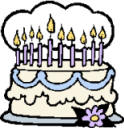
I’M SO GLAD I TOOK THE TIME AND EFFORT TO DO THIS! It opened the door for me to wonderful new relationships.
Another enormously challenging area of learning was how important it is to watch extreme loyalty (codependency)—sticking with people (family, friends or lovers) when they practice self-destructive behaviors. We are doing neither them nor us a favor when we do not let them know their behaviors are not okay with us. The responsible action to take here is to communicate we will stay in relationship with them only if they are willing to make changes...and to follow through on those changes. We can also tell them we love them and deeply hope they take responsibility for their choices.
Explore: When Helping You Is Hurting Me and Thoughts On Healing and Helping Yourself and Others
Dear Friends,
Consider these questions today. This can apply to a romantic partner, but family or even in the business world...or really to any relationship:
1. Are you in love? Creating Healthy Relationships
(this article)
2. Are you still in love?
Loving-Kindness: Learn to Befriend Ourselves and Others
and
Love Your Body!
3. Do you want to reconnect with the person you used to love?
4. Do you think that he or she
is happier than you are now?
How to Develop a Loving Relationship with You
5. Do you have the time for each other or are you both to
busy?
Overwhelmed?
Are You Taking In Too Many Empty Calories?
and
Help! I'm movin' too fast! I need to slow down!
6. Have you been able to preserve your freshness and beauty for yourself
and for the other person?
7. Are you capable to offer
him or her freshness and beauty everyday?
CELEBRATING The Simple Joys Of Life!
8. Do you know how to handle the suffering in yourself?
Four Foundations of
Mindfulness
9. Are you able to help handle the suffering in the other
person?
Relax, Observe, and Allow
10. Do you understand your own suffering and the roots of that
suffering?
Getting to Know Your Stress and How to Management It
and
Out Of Hell, Into Freedom
Thoughts
11. Are you able to understand the suffering in the other person?
Make Your Mind an Ocean: Become Your Own Therapist!
12. Do you have the capacity to help the other person suffer less?
Thoughts On Healing and Helping Yourself and Others
13. Have you learned the way to calm down the painful feelings and
emotions?
Dialectical behavior therapy
14. Do you have the time to listen
to yourself, your suffering, your difficulties, and your deepest desire?
Mental Nutrients: What To Say When You Talk To Your Self
15. Do you have the time to listen to him or her and help him or her to
suffer less?
16. Do you know the Buddhist way
of restoring communication and bringing reconciliation?
Non Violent Communication
17. Are you capable of creating a feeling of joy and happiness for
yourself?
Peace!
18. Are you capable of helping the other person to create a feeling of
joy and happiness?
Be Happy and Contented!
19. Do you really think you have a clear spiritual path to go?
What Is Life About? Heart Advice
20. Do you have the feeling of peace and contentment within yourself?
Invent A New Life!
21. Do you know how to nourish your love everyday?
Rules For Being Human
Excellent resources:
This book below is great and assists in solving common challenges in couple ships:
7 Principles for making marriage work
book:
http://www.amazon.com/Seven-Principles-Making-Marriage-Work/dp/0609805797
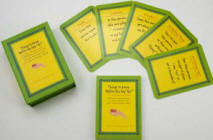 Here
is another excellent resource: Things to know before you say GO
http://elsbethmartindale.com/product/things-to-know-cards/
Here
is another excellent resource: Things to know before you say GO
http://elsbethmartindale.com/product/things-to-know-cards/
Distorted thinking cards: http://elsbethmartindale.com/product/distorted-thinking-cards/
Check out her products too: http://couragetobloom.com/products
Additional articles:
Seeking Support, Counseling, and Outside Resources
What Is Life About? Heart Advice
Home Coming: Reclaiming and Championing Your Inner Child (Healing from adverse childhood experiences)

